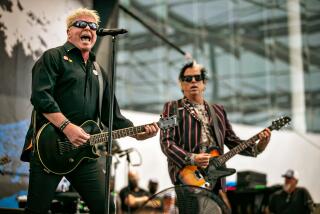Offspring Lifted Key Guitar Riff, Publisher Says : Pop music: Manager denies ‘Come Out and Play’ Arabian hook is Agent Orange creation.
- Share via
“You gotta keep ‘em separated” goes the refrain that helped make Offspring’s “Come Out and Play” a huge hit last year on radio and MTV.
*
But the publisher of a classic Orange County punk song that Offspring songwriter Bryan (Dexter) Holland has cited as an important influence maintains that Holland failed to do just that when it came to recording the snaky Arabian guitar hook that figures prominently in “Come Out and Play.”
Robbie Fields contends that the two-bar guitar phrase, frequently repeated during “Come Out and Play,” copies the guitar solo in “Bloodstains,” an Agent Orange song that first emerged in 1980 on the “Rodney on the Roq” punk compilation album on Fields’ Posh Boy label. Offspring manager Jim Guerinot denies that the two pieces of music are identical.
Agent Orange’s leader, Mike Palm, wrote “Bloodstains” in 1979, and Fields owns the copyright. Fields wants Offspring’s label, Epitaph, to pay a licensing fee for the use of what he says amounts to a “sampling” of Agent Orange’s music; he said his representatives at the Harry Fox Agency, an organization that collects royalty fees for music publishers, have sent Epitaph a licensing document that formally seeks payment for use of Agent Orange’s music.
Fields said the standard fee would be 1 cent for each Offspring album sold; given that “Smash,” the Offspring album that features “Come Out and Play,” has sold a reported 6 million copies worldwide, Fields could collect $60,000 or more if his claim is successful.
A spokesperson for Epitaph said the label had no comment, but Guerinot said last week that Fields’ claim is baseless.
“They’re not even close to identical. They’re both in the same scale, (and) there’s no doubt there’s an influence, (but) it doesn’t mean that it’s stolen,” he said. “If (Fields) feels he has something, he’ll sue, and if we’ve done something that is proven wrong (by technical analysis of the two songs) we should be sued. But we don’t feel there’s any merit to it.”
“Nobody has filed a lawsuit against anybody, and nobody has threatened a lawsuit,” Fields said, adding that he regards “Come Out and Play” as “a brilliant song” in its own right. “Nobody wants to pillory anybody. But I feel I have a fiduciary duty to represent Mike Palm’s interests.” Fields said he would split any licensing fee evenly with Palm.
Palm, who has finished work on a new Agent Orange album and is seeking a record deal, said: “Anyone who listens will know what the issue is. I’m not really going to state my opinion at this time, but I invite anyone to compare the songs.”
Last April, when “Come Out and Play” was just beginning to emerge as a hit on KROQ-FM, Holland cited “Bloodstains” as one of the first songs to spark his interest in punk rock.
“My older brother bought a ‘Rodney on the Roq’ record,” he said in an interview at the time. “ ‘Bloodstains’ really influenced me, especially that Arabian-sounding lead. I’ve written a lot of stuff like that.”
Frank Agnew, a respected guitarist from the early Orange County punk scene, whose old band, the Adolescents, also has been cited as an influence by Offspring, questioned how anybody could claim ownership of a guitar part based in Middle Eastern folk music.
(Palm himself has acknowledged the influence of ‘60s surf guitarists such as Dick Dale, whose recording of the Middle Eastern tune “Miserlou,” revived last year as the theme music to the film “Pulp Fiction,” was covered by Agent Orange on their 1981 debut album, “Living in Darkness.”)
“I don’t see how you can call that plagiarism; all it is is an Arabic scale,” Agnew said. “It just reeks to me (as if) people are after a piece of the pie. If the Offspring did a guitar solo that was reminiscent of one of my guitar solos, I’d be honored, not (antagonized). I think it’s real petty.”
More to Read
The biggest entertainment stories
Get our big stories about Hollywood, film, television, music, arts, culture and more right in your inbox as soon as they publish.
You may occasionally receive promotional content from the Los Angeles Times.










